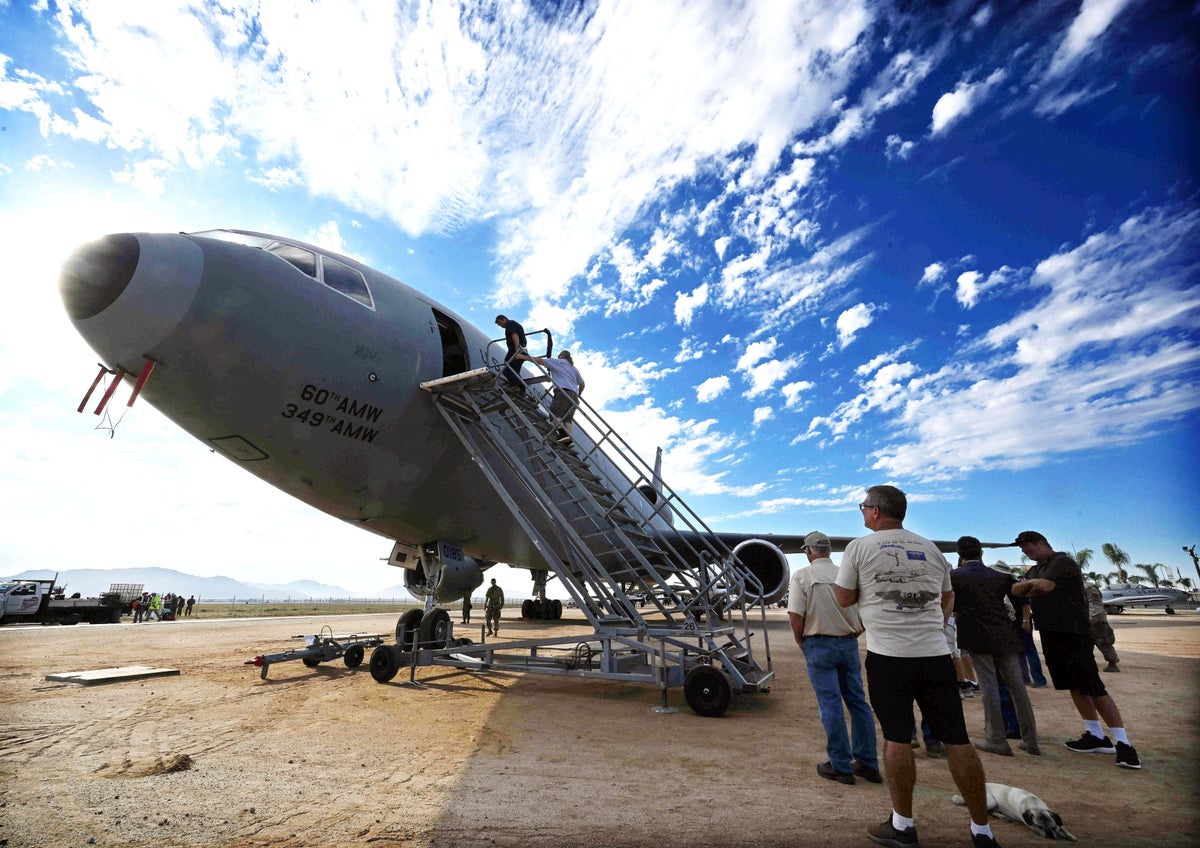
A pilot accused of threatening to shoot a commercial airline captain if they diverted their flight to give a passenger medical attention is an Air Force Reserve lieutenant colonel who was relieved of command for refusing the COVID-19 vaccine.
Jonathan J. Dunn's military service came to light in a Utah U.S. Attorney’s Office filing Thursday in which a judge was asked to delay his arraignment for 45 to 60 days to allow time for the U.S. military to bring Dunn back from overseas.
Dunn was indicted Oct. 18 and charged with interfering with a flight crew over the alleged in-flight incident in August 2022. The Transportation Department’s inspector general had said Dunn threatened to shoot the captain during the disagreement over whether to divert because of the passenger’s medical issue.
Dunn was afterward sent on orders to Ramstein Air Base in Germany, training to serve at the 603rd Air Operations Center. The Air Force has suspended his access to sensitive information and to the air operations center because of the airline incident, according to a spokesman for the Air Force in Europe.
Phone messages and an email seeking comment from Dunn’s lawyer were not immediately returned Thursday.
Though Dunn flew for Delta Air Lines, investigators have not said on which airline or route the confrontation happened. On Wednesday, Delta said Dunn no longer worked there, and federal officials say his authority to carry a gun on board was revoked.
He is the same Jonathan Dunn who unsuccessfully sued the Pentagon to prevent the Air Force from disciplining him for refusing to receive a mandatory COVID-19 vaccination, according to a person familiar with the matter who would only discuss non-public information on condition of anonymity.
Dunn objected to the vaccine on religious grounds. He also argued that he was already protected because he contracted the virus in 2021. The U.S. Supreme Court declined in a 6-3 decision to consider whether to block further punishment for him while his case proceeded.
Dunn had been relieved of command after contracting the coronavirus and refusing the vaccine in 2021, and faced being sent to the Individual Ready Reserve where he could not serve in any unit or be eligible for training opportunities, according to a Supreme Court filing.
Whether Dunn was punished further was unclear from court documents.
According to court records, Dunn was commissioned as an Air Force officer in 2003 and logged more than 1,400 hours flying combat missions over Afghanistan. He left active duty and joined the Air Force Reserve in 2014, serving as commander of a reserve squadron at March Air Reserve Base in California, according to the Air Force.
During active duty, Dunn flew a bomber and reconnaissance plane in combat over Afghanistan, as well as training aircraft, according to the Supreme Court filing.
After the Air Force rejected his request for a religious exemption from a required COVID-19 vaccination, Dunn was removed as a commander in February 2022. He immediately sued the Pentagon and Defense Secretary Lloyd Austin.
Dunn’s lawyers said he had received many other vaccines but raised a religious objection to the COVID-19 vaccine because government leaders elevated it from a health measure to a procedure with “symbolic and sacramental quality.” After losing in lower courts, Dunn’s appeal to the U.S. Supreme Court was dismissed in April 2022 in an unsigned order that gave no explanation for the decision. Three conservative justices – Clarence Thomas, Samuel Alito and Neil Gorsuch – opposed dismissal of the case.
A grand jury in Utah issued the indictment against Dunn on Oct. 18 over the alleged threat against a fellow pilot in August 2022, charging him with interference with a flight crew, according to federal court records.
Dunn was the first officer, or co-pilot, on the flight and authorized to carry a gun under a program run by the Transportation Security Administration, according to the inspector general office for the U.S. Department of Transportation.
Dunn had threatened the captain with being shot “multiple times” if they diverted, the inspector general’s office said in an email Tuesday.
Why the indictment came down more than a year after the incident was unclear. Utah U.S. Attorney’s Office spokeswoman Felicia Martinez did not immediately return phone or email messages Thursday.
Interference with a flight crew is a felony punishable by up to 20 years in prison. An arraignment was scheduled for Nov. 16.
The pilot’s indictment came a few days before an off-duty Alaska Airlines pilot riding in the cockpit jump seat tried to shut down the engines of a Horizon Air jet in mid-flight, according to authorities. He was subdued by the captain and co-pilot and arrested after the plane diverted to Portland, Oregon.
Joseph David Emerson of Pleasant Hill, California, told police he was suffering from depression and had taken psychedelic mushrooms 48 hours before the flight. He pleaded not guilty in state court in Oregon to charges of attempted murder.







